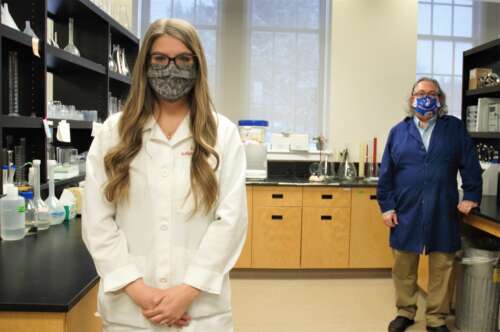
Treating or preventing heart damage caused by COVID-19 infection is the goal of a new University of Guelph research project.
The project also aims to tease out why male-female differences exist in heart injury and how those variations may be linked to the COVID-19-causing coronavirus.
Early in the pandemic, doctors noticed that patients being treated for COVID-19 showed signs of cardiac injury, including people without previous heart disease, said Dr. Glen Pyle, a professor in the Department of Biomedical Sciences.
“When COVID started, we saw early significant signs of heart injury and significant differences in outcomes by sex,” said Pyle, whose lab studies differences in occurrence and treatment of heart attacks between men and women.
That suggests that survivors of the respiratory disease (so-called “long haulers”) may suffer long-term cardiovascular problems from heart failure to heart arrhythmia.

In April and May 2020, about one in five COVID-19 patients displayed signs of heart problems, he said. “This virus is not a heart disease, so that’s an astounding number. We are seeing people recover who develop cardiac disease within weeks or months.”
In what Pyle believes is the only study of its kind, he hopes to learn why.
He said the virus could be directly affecting heart cells, although he thinks the injuries stem from a “cytokine storm.” Chemicals called cytokines are normally summoned by the body to combat infection. In some cases, the immune system may go into overdrive and cause life-threatening inflammation.
The same kind of inflammatory response occurs in a heart attack, he said.
He said scientists know that “viral infections do increase your risk for cardiovascular disease. Just because you recover from COVID doesn’t mean you’re free and clear. There can be long-term complications.”
The U of G researchers have zeroed in on about 12 proteins normally involved in cell growth and regulation in the heart. In response to heart problems, some of these proteins help protect against injury while others can worsen the damage.
In the lab, PhD student Kathy Jacyniak is studying changes in these proteins caused by the coronavirus. She’s using infected animal heart tissue sent by Dr. Alyson Kelvin and graduate student Magie Francis at VIDO-InterVac (Virus and Infectious Disease Organization) at the University of Saskatchewan.
She’s also looking for sex differences in expression of the proteins following COVID-19 infection. “We know that in heart disease, men and women have different disease progression. We want to see whether similar trends occur with COVID” said Jacyniak, who works with Pyle and biomedical sciences professor Dr. Matt Vickaryous.
Pyle said infection and death rates from the novel coronavirus have affected men and women differently. Early in the pandemic, more men than women died or were admitted to hospital ICU, although improved treatment has narrowed those differences.
Women have a slightly higher rate of COVID-19 infection in Canada, Pyle said, noting that they account for about 80 per cent of health-care workers.
Pinpointing the cause of the damage could help in developing drugs and other therapies to treat the heart or the immune system. Pyle said he hopes to ultimately help in designing those therapies.
“We lack fundamental information about how the damage is caused.”
Contact:
Dr. Glen Pyle
gpyle@uoguelph.ca